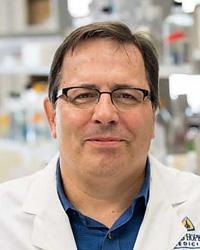Research Lab Results
-
Samantha Pitts Lab
Research in the Samantha Pitts Lab focuses on care safety and quality in ambulatory patients. Specifically, our activities have included applying the Comprehensive Unit-based Safety Program (CUSP) in office-based practices and improving the delivery of evidence-based care through clinical care teams.
-
Samuel Durso Lab
The Samuel Durso Lab researches effective education models for preparing the next generation of geriatric educators. Specifically, we have developed and evaluated the ""Train the Trainer"" program to prepare faculty to teach geriatric medicine.
-
Samuel R. Denmeade Laboratory
The main research goals of my laboratory are: (1) to identify and study the biology of novel cancer selective targets whose enzymatic function can be exploited for therapeutic and diagnostic purposes; (2) to develop methods to target novel agents for activiation by these cancer selective targets while avoiding or minimizing systemic toxicity; (3) to develop novel agents for imaging cancer sites at earliest stages. To accomplish these objectives the lab has originally focused on the development of prodrugs or protoxins that are inactive when given systemically via the blood and only become activated by tumor or tissue specific proteases present within sites of tumor. Using this approach, we are developing therapies targeted for activation by the serine proteases prostate-specific antigen (PSA), human glandular kallikrein 2 (hK2) and fibroblast activation protein (FAP) as well as the membrane carboxypeptidase prostate-specific membrane antigen (PSMA). One such approach developed in the lab consists of a potent bacterial protoxin that we have reengineered to be selectively activated by PSA within the Prostate. This PSA-activated toxin is currently being tested clinically as treatment for men with recurrent prostate cancer following radiation therapy. In a related approach, a novel peptide-cytotoxin prodrug candidate that is activated by PSMA has been identified and is this prodrug candidate is now entering early phase clinical development. In addition, we have also identified a series of potent inhibitors of PSA that are now under study as drug targeting and imaging agents to be used in the treatment and detection of prostate cancer.
-
Sanjay Desai Lab
Research in the Sanjay Desai Lab focuses primarily on clinical outcomes in survivors of critical illnesses, such as acute lung injury. We also investigate techniques to improve graduate medical education and are conducting a clinical trial on the comparative effectiveness of models that optimize patient safety and resident education. Our research examines factors such as residency work-hour reform, hand hygiene practices and the use of etiquette-based communication.
-
Saowanee Ngamruengphong Lab
Research in the Saowanee Ngamruengphong Lab focuses on methods for diagnosing and managing gastrointestinal conditions, including premalignant and malignant lesions of the gastrointestinal tract, esophageal cancer, colon polyps, and biliary and pancreatic disease. Our most recent work includes investigating a novel hybrid technique for closure of refractory gastrocutaneous fistula. We also conducted an international multicenter study that compared endoscopic ultrasound-guided pancreatic duct drainage with enteroscopy-assisted endoscopic retrograde pancreatography following Whipple surgery.
-
Sapna Kudchadkar Lab
Work in the Sapna Kudchadkar Lab focuses on the impact of sleep disturbances on critically ill children and the impact of sleep promotion, optimizing sedation and preventing delirium in pediatric critical care patients. We're investigating the effects of critical illness on sleep-wake cycles during short- and long-term recovery using actigraphy. -
Sara Cosgrove Lab
The Sara Cosgrove Lab researches how infections with antibiotic-resistant bacteria affect patients. We are interested in the methods needed to make sure patients receive the best possible antibiotic treatment, including the development of tools and programs to promote the rational use of antimicrobials. We also study the epidemiology and management of S. aureus bacteremia.
-
Sara Mixter Lab
Research in the Sara Mixter Lab focuses on primary care medical education, particularly quality improvement, high-value care and care transitions for adolescents with developmental disabilities and other special health care needs.
-
Sarah Clever Lab
Work in the Sarah Clever Lab focuses on medical education, patient-provider communication and the role of shared decision-making in patient recovery. We recently examined the ethical dilemmas of caring for “influential” patients whose attributes and characteristics (for example, social status, occupation, or position), coupled with their behavior, have the potential to significantly affect a clinician's judgment or actions.
-
Saraswati Sukumar Lab
Our lab is focused on using comprehensive gene expression, methylation and sequencing and metabolomics analysis to identify alterations in breast cancer, and exploiting these for early detection and therapy. Among deferentially expressed genes, our lab has focused on the HOX genes. HOX genes are intimately involved in the development of resistance to both chemotherapy and to agents targeting the estrogen receptor. Our work explores the alternate pathways that are activated by HOX proteins leading to this resistance and novel treatments to overcome resistance in both tissue culture and xenograft models. In addition, epigenetically silenced genes and a metabolic reprogramming in tumors also trigger novel early detection and therapeutic strategies. We are testing the utility of differentiation therapy through reactivating RAR-beta in breast cancer using histone deacetylase inhibitors with great success. Also, we are targeting enzymes involved in gluconeogenesis and glycolysis with small molecule FDA-approved antimetabolites to achieve antitumor effects.

